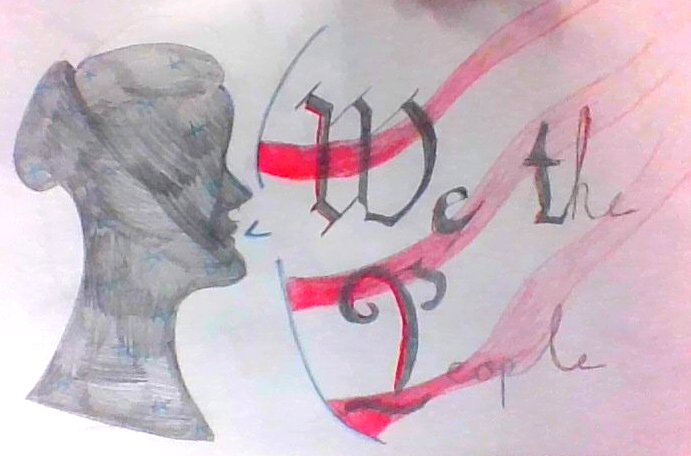“If men were angels, no government would be necessary,” Madison said.
James Madison, the Father of the Constitution himself, held these ideals within his soul. Madison was not a cynicist, nor a misanthrope. Rather, his perspective was that of realism. The government is structured to fulfill the needs of the people, to support civility and organization for the sake of social good, at the price of uninhibited freedom.
Everyone has their idea of “constitutional”. It is an idea played again and again, engraved into our ideologies, and solidified in the American zeitgeist. Nearly every day, all around us, we hear claims that action “isn’t in the Constitution”, or rather, that “the Constitution protects my right to” x, y, and z.
These statements, equally ubiquitous and flippant, damage the integrity of interpretation and turn democracy into a cliche.
But what does “constitutional” really mean? By its most basic definition, the adjective adheres to all that falls under our governing document. However, understanding the content of the blueprint of our nation realizes the importance of the American government and the role we play in it.
We need to understand the Constitution, going into the election season.
To understand what is constitutional, we must first understand the Constitution.
The Constitution is a living, breathing document, that a fluid nation must respirate. The Supreme Court exists to extend judicial review, to ensure that our constantly shifting world and its policies remain under the ideals of the Constitution.
Our amendment process further provides a way to practice the promise of evolution, with the needs of a maturing world. Echo Brooke (11) comments on the importance of this process, saying “It is important our {Constitution} can be changed. We stopped wearing powdered wigs a long time ago.”
Our Constitution can not and should not be trifled with. Within each of its seven articles, it aims to practically approach every angle of government, and work to balance that precarious pendulum of federalism.
How we interpret the Constitution highlights our intent of the nation. How we interpret what applies to the Constitution hinges on our perspective on politics as a whole.
We cannot be fully educated on the candidates in this coming election, without knowing how their stances apply to your view of the Constitution. We cannot vote with full knowledge without knowing the government our President will represent.
“A majority of the country thinks their voice doesn’t matter, but if they put their voices together, they can impact the outcome,” Tyler Bugg (11) says on this principle of democracy.
The Constitution is not to be skimmed, it is not an iPhone “Terms and Conditions” page. We cannot just know of generally, but not concern ourselves within such details. We do not just exist, floating within the realm of the Constitution.
We are not just governed by its law. Its supremacy grants your liberty and secures our civility. It has defined the reality of humanity we are fortunate to live in. It reigns over the ground we stand upon, and the air we breathe. Not that of the federal government, but the framework of freedom.
The Constitution is our lawyer, our doctor, our neighbor. It, like us, engages its ideals and adapts to the need for social good. It, like us, serves a greater purpose when we take the time to know it.
When Anti-federalist political scientists banded together to write Brutus 1, they argued that a nation as large as the United States was not fit to be ruled under a single government.
These authors insisted instead that our society, so varied and diverse, would become polarized. That our need to push an agenda would exceed any progress made, only slowing the wheels of change.
In modern retrospection, we fear for the possible truth of these fears. How can we not admit to such? Perhaps the existence of division is the one thing that unites us.
However, in the face of such fears, in the depths of cynical reality, the Constitution was written, not as a fortune but as a promise. As a covenant.
Our Founding Fathers had faith in us, as citizens.
They believed that our diversity strengthened us, and our voices blended not as a cacophony, but a symphony. They dreamed of a future where our perspectives pushed for the betterment of our country. They imagined that our debate conjure insightful discussion, not discourse.
They believed in the good of our people. They trusted in the strength of our nation.
The Constitution faced the chasm of division and declared us the United States of America.
We need to build a nation worthy of defiance in the face of these fears. We must justify the optimism our Founding Fathers depended on when crafting our nation. We must practice this, heading into the election season. We, the people, to form a more perfect union, must take a stand.
We do this by informing ourselves. We practice this through debate, not yelling, but rather truly hearing each other. Whether it is to reassert our beliefs or consider another side. We secure our freedoms when we know our freedoms.
To speak directly: Know the Constitution.
Let us fulfill the hope outlined in the Federalist Papers, that justified the freedom the Constitution so benevolently provides.
After all, “What is government itself, but the greatest of all reflections of human nature?”
Read the Constitution here: https://www.archives.gov/founding-docs/constitution-transcript




Rathi Thiagarajan | Oct 7, 2024 at 10:36 pm
ok AP gov buddy